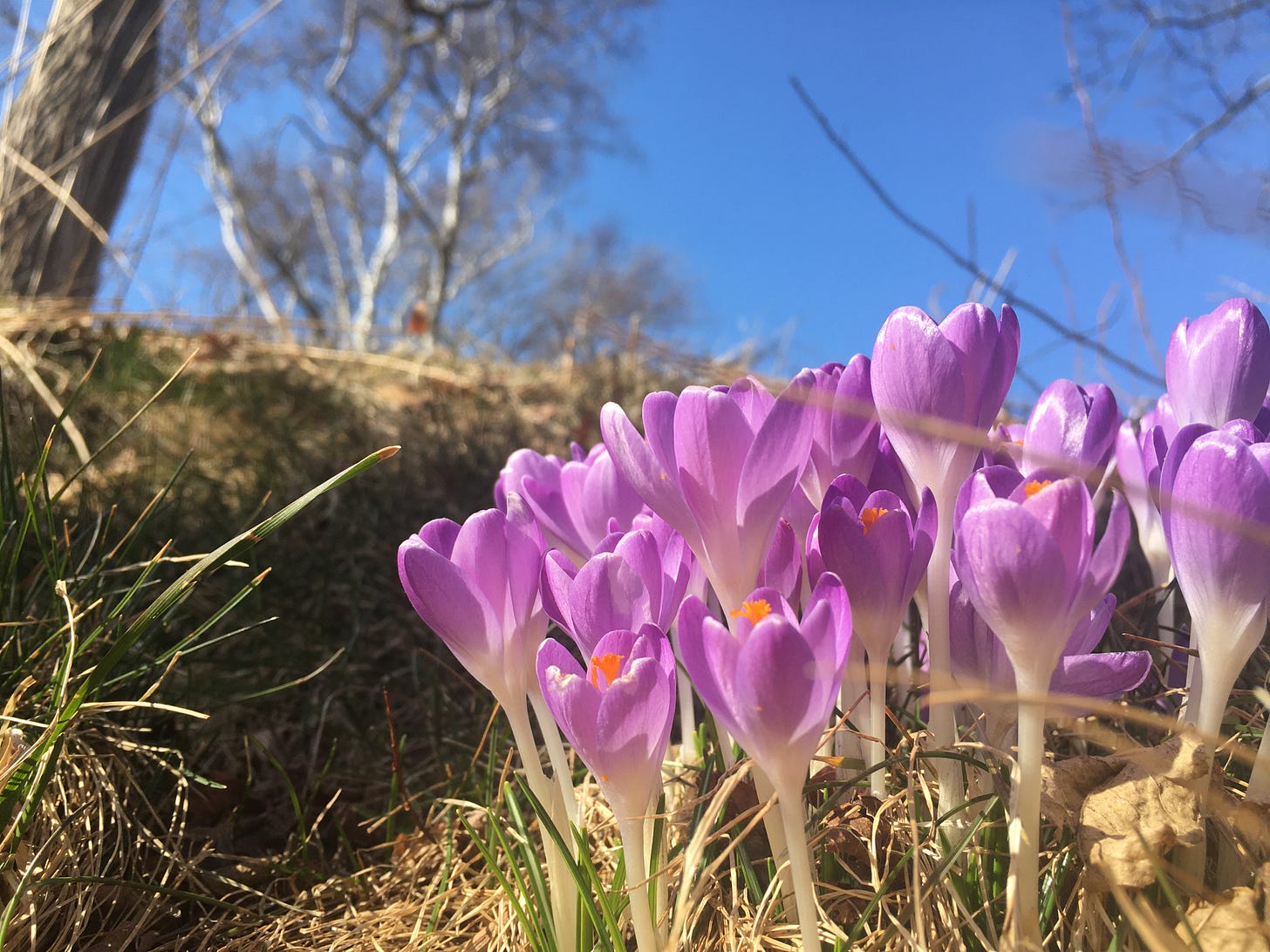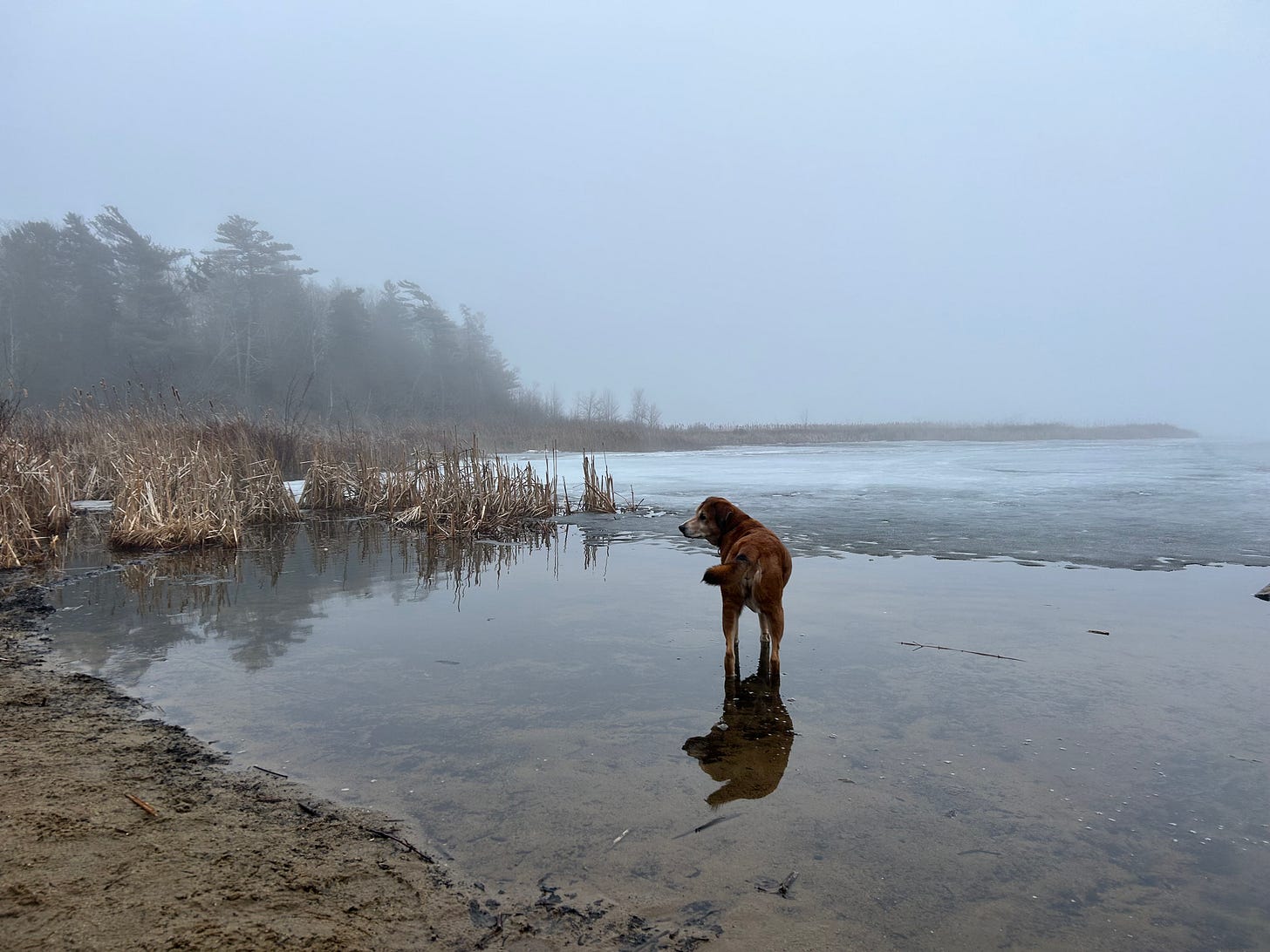What language can do
Hospitals, treasure maps, solace.
Thanks for visiting Permission Slips! Upcoming events:
Sunday, April 6th, from 10am - 1pm, join us for Awakening the Senses, a mini somatic writing retreat at Good Medicine Collective in Portland, Maine. Hearty and delicious snacks included. Please note: This will be our last in-person offering until fall.
September 19th - 21st, 2025 Intuitive and Free: Embodied writing and equine immersion retreat in Northfield, New Hampshire
Back in the early days of my auto immune disease, before my medical records took up an entire file cabinet, I found myself constantly befuddled by the language of the medical field.
When medication after (ridiculously costly) medication didn’t work, I was told I had failed them. My medical paperwork classified my colon as “non-compliant.” And when I called the nurse to say I was too weak and inflamed to eat, she told me she’d make a note that my situation was emergent.
“Emergent?” I asked. “Hasn’t it already emerged fully? Are we waiting for something else to happen?”
“No,” She sighed. “As in emergency.”
Oh. This was not my kind of poetry.
Because language mattered to me. Language has always mattered to me. I was the kid who stood on the periphery soaking up words. I kept journals before I could write, scribbling approximated proto-letters. As an adult, part of my work is to listen for the dynamics underneath what is said, feeling for sensation and belief. So I recognized what was happening; these words pretended neutrality, but they told me everything about how the medical system regarded a body like mine: deviant, failing. Uninhabited.
And yes, I get the utility of reducing a body to its pathologies in a system that’s supposed to fix them, but it felt like such a missed opportunity. Because words can also be a source of great, enlivening support.
Resonant language - in poetry or story or lyric or etymology - creates recognition and repair. When I’m feeling overwhelmed by the terrible (which, lately: A LOT) words are a map to what matters. There are treasures there, secret instructions.
Consider the word solace, which comes from the Latin solari, to console. But Solari derives from the Greek hilaros, meaning “cheerful,” what you might recognize as the source of hilarious (more at Merriam-Webster).
Inside solace, this truth: to get through the difficult, we need both care and humor. Which, if you’ve experienced illness or grief, you likely already know. Over-serious sympathy can sap our reserves. But a well-landed, irreverent joke? Real solace.
If you listen, you might start to recognize the places where language lifts and connects. Like a recent Zoom meet up, which friends titled, “World is ending / friendship is mending.” Or the unreasonable joy I get from the memes my sisters send, equal parts rallying and ridiculous (“How can you make jokes at a time like this ?!” “Sir, that dark sense of humor is a load-bearing structure.”)
For me, reclaiming my body back from the medical field also meant finding language that described me from the inside. It’s what led me to develop an embodied writing practice, and why so many of my posts (this one included!) end with a way of getting into our words through our bodies.
Because language can guide our attention to wonder, grief, absurdity, the ribald, the beautiful, each other. To a place where we celebrate our non-compliance.
Outside my window, an early spring cluster of white and purple crocuses. Now this, I think, is emergent. Life is emergent. So are you.
Somatic Writing Practice
In this spirit, I’m sharing with you a prompt from our Following the Creative Breath series (side note: when I’d designed this series back in November, I’d had no idea how essential, how absolutely necessary, this collective gathering would feel).
For this practice, we’ll begin with gentle movement and then let a poem from Ross Gay ignite our writing. The poem showcases Gay’s uncanny gift for finding solace - as in joy - amidst the real seeing. It’s also one of my favorite poems for spring (that last line!)
Movement
To begin, breathe. Remember you’re in gravity. Roll your eyes and tongue. Bend your spine forward and back and side to side, in horizontal planes. Invite yourself to get a little loose: Might it feel good to roll your shoulders, press your feet into the floor, or take a long, audible sigh?
Then, see if you can create a line of awareness from your heart to your brain and then out your through eyes. Could you play with letting your looking be directed by curiosity, even love? Turn your head slowly, side to side, feeling this out.
Then, read Ross Gay’s Sorrow Is Not My Name (aloud, if you have space to do so). As you read, notice how Gay repeats “Look” through the lines, and how this thread makes the looking itself a kind of gathering of evidence, away from sorrow.
Sorrow Is Not My Name
BY ROSS GAY
—after Gwendolyn Brooks
No matter the pull toward brink. No
matter the florid, deep sleep awaits.
There is a time for everything. Look,
just this morning a vulture
nodded his red, grizzled head at me,
and I looked at him, admiring
the sickle of his beak.
Then the wind kicked up, and,
after arranging that good suit of feathers
he up and took off.
Just like that. And to boot,
there are, on this planet alone, something like two
million naturally occurring sweet things,
some with names so generous as to kick
the steel from my knees: agave, persimmon,
stick ball, the purple okra I bought for two bucks
at the market. Think of that. The long night,
the skeleton in the mirror, the man behind me
on the bus taking notes, yeah, yeah.
But look; my niece is running through a field
calling my name. My neighbor sings like an angel
and at the end of my block is a basketball court.
I remember. My color's green. I'm spring.
—for Walter Aikens
Writing Prompt
Breathe again. Gather your notebook. Set your time for 10 minutes.
Write into: But look…
What will you see, when you let your heart lead? When you let solace inform the exploration? Feel free to share in the comments below.




